‘No one is happy’: Contact tracers in S. Korea report burnout
By Kim ArinPublished : Nov. 26, 2020 - 18:02

Months into the pandemic, contact tracers in South Korea are battling burnout and psychological distress, according to a recent study.
Yoo Myoung-soon, a public health communications professor at Seoul National University, reported the findings after conducting five rounds of group interviews with 20 contact tracing officials in Gyeonggi Province between Oct. 24 and Nov. 7.
The study published Thursday showed over 80 percent of surveyed contact tracers were experiencing “high levels of burnout” based on emotional exhaustion scores. Their average posttraumatic embitterment disorder score was 2.04, which indicates “persistent feelings of embitterment.”
All of the contact tracers included in the study said they were being overworked.
Contact tracers were working overtime weekdays and weekends alike, often more than 100 additional hours a month, with public holidays and vacations “hardly ever observed.” Sometimes a day would begin at around 7 a.m. and end between 4 and 5 a.m. the next day.
Contract tracers also said they often found themselves mired in “moral dilemmas” in the course of their duties.
“When a person is newly diagnosed with the coronavirus, contact tracers look through things like his or her credit card history, smartphone GPS data and closed-circuit TV records of places they had visited. This doesn’t feel right,” read one of the excerpts from the interviews.
Publishing the personal details and travel history of infected people is a practice “no one is happy about,” the contact tracers were quoted as saying.
“Places visited by patients are cleaned and disinfected, and all their contacts are almost immediately informed. Putting their information online is unnecessary from a health perspective, but I think the government wants to show people that these efforts are being done.”
Yoo said given the labor intensive nature of the work, contact tracers were “not being compensated fairly.” “As cases surge once again across the country, contact tracing can’t be expected to catch up with the rising demand without due compensation or staff augmentation.”
By Kim Arin (arin@heraldcorp.com)









![[Today’s K-pop] BTS pop-up event to come to Seoul](http://res.heraldm.com/phpwas/restmb_idxmake.php?idx=644&simg=/content/image/2024/04/17/20240417050734_0.jpg&u=)

![[Graphic News] More Koreans say they plan long-distance trips this year](http://res.heraldm.com/phpwas/restmb_idxmake.php?idx=644&simg=/content/image/2024/04/17/20240417050828_0.gif&u=)






![[KH Explains] Hyundai's full hybrid edge to pay off amid slow transition to pure EVs](http://res.heraldm.com/phpwas/restmb_idxmake.php?idx=652&simg=/content/image/2024/04/18/20240418050645_0.jpg&u=20240419100350)

